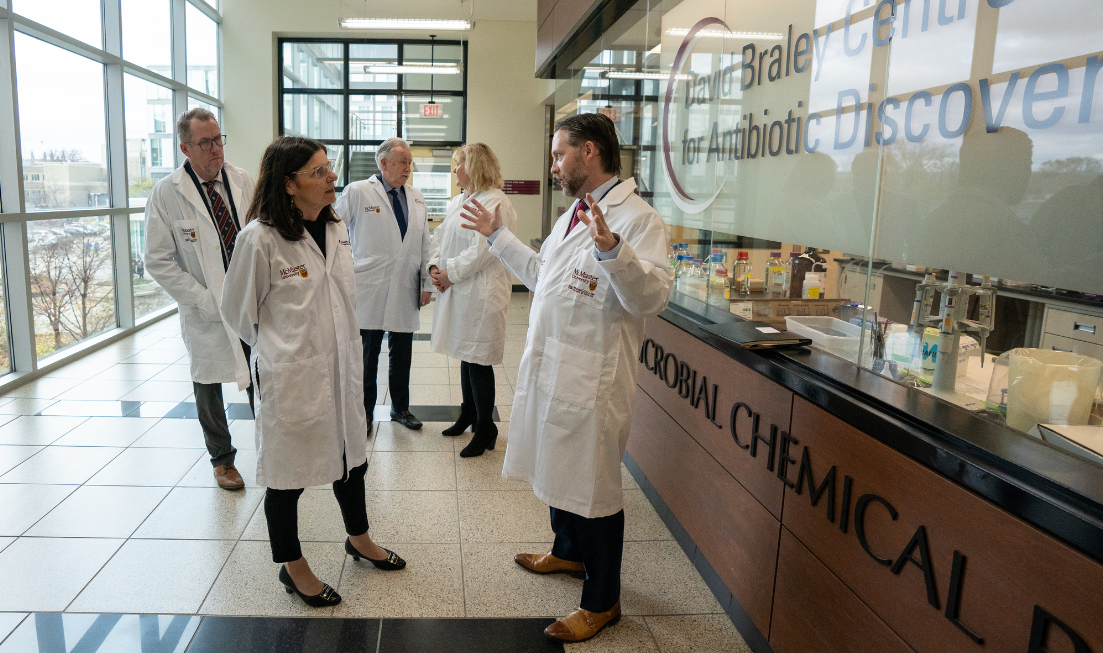Government of Canada invests $4M in McMaster to fast-track drug discovery initiatives

Filomena Tassi, second from left, local MP and the minister responsible for the Federal Economic Development Agency for Southern Ontario, announced a federal investment of $4 million to upgrade and expand drug discovery initiatives at McMaster. The funding will support the establishment of a research centre that will be part of McMaster's Global Nexus, a health innovation accelerator led by Matthew Miller, at right. (Photo by Georgia Kirkos, McMaster University)
BY Blake Dillon, Global Nexus
November 28, 2024
McMaster University has received $4 million in federal funding to upgrade and significantly expand its drug discovery infrastructure.
With the new investment from the Federal Economic Development Agency for Southern Ontario (FedDev Ontario), McMaster’s Global Nexus will establish the Centre for Collaborative Chemistry (C3) on campus.
Global Nexus, a health innovation accelerator that addresses the challenges of translating and commercializing health-relevant discoveries, will leverage C3 to not only fast-track university drug discovery and development, but also to support similar research at small and medium-sized enterprises (SMEs).
“Supporting Canada’s life sciences sector is crucial for driving innovation and improving healthcare outcomes here in Canada and around the world,” says Filomena Tassi, the minister responsible for FedDev Ontario.
“Through this investment, McMaster University and C3 will provide SMEs with the expert support and talent needed to accelerate the development and commercialization of Canadian pharmaceutical products.”
C3 will significantly expand and enhance the university’s drug discovery infrastructure, based now at the Centre for Microbial Chemical Biology (CMCB).
“McMaster has long been a powerhouse in drug discovery research, and this investment will ensure that we remain one for many years to come,” says Andy Knights, McMaster’s acting vice-president, Research.
“C3 will build on the great legacy of the CMCB and ensure that our drug discovery efforts lead to new, made-in-Canada therapies for a variety of health conditions.”
In addition to upgrades, the investment will support the purchase of new equipment to expand the scope of research to a range of diseases, the hiring of more staff, the creation of new industry partnerships, and the development of experiential learning opportunities for students and trainees.
“This transformational support from FedDev Ontario will fast-track drug discovery and development in Canada,” says Matthew Miller, executive director at Global Nexus.
“With new capacity for research, partnerships, and training, McMaster is better positioned than ever to help drive new therapies to market.”
“With this important funding, McMaster not only cements its leadership in academic drug discovery, but also becomes a catalyst for new activity across the local biopharma sector,” says Paul O’Byrne, dean and vice-president of the Faculty of Health Sciences.
Drug discovery is a critical priority for Global Nexus, which is also working to move new vaccines, diagnostics, and other health technologies to market.
This work is integral to maximizing the impact of academic discoveries, says Susan Tighe, McMaster’s provost and vice-president (academic) and the incoming president and vice-chancellor.
“It’s our mission at McMaster to ensure that academic research is having a positive impact on society — both in Canada and around the world,” she says. “Global Nexus is ensuring that we do just that, and this government investment will accelerate this work.”
Tassi announced the funding at McMaster on Nov. 28.


